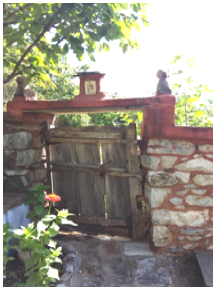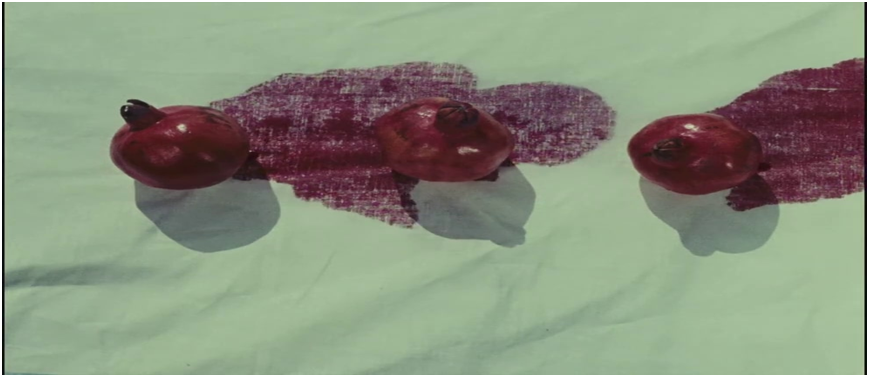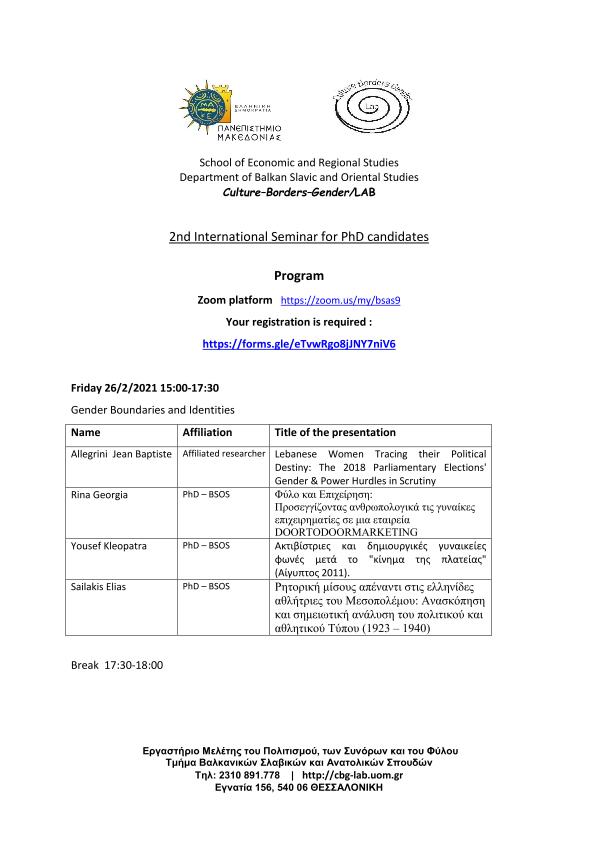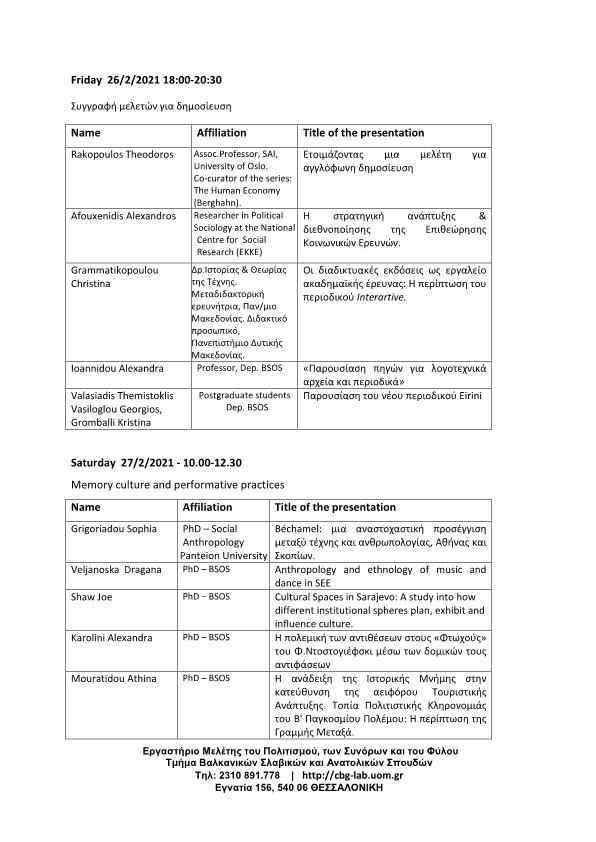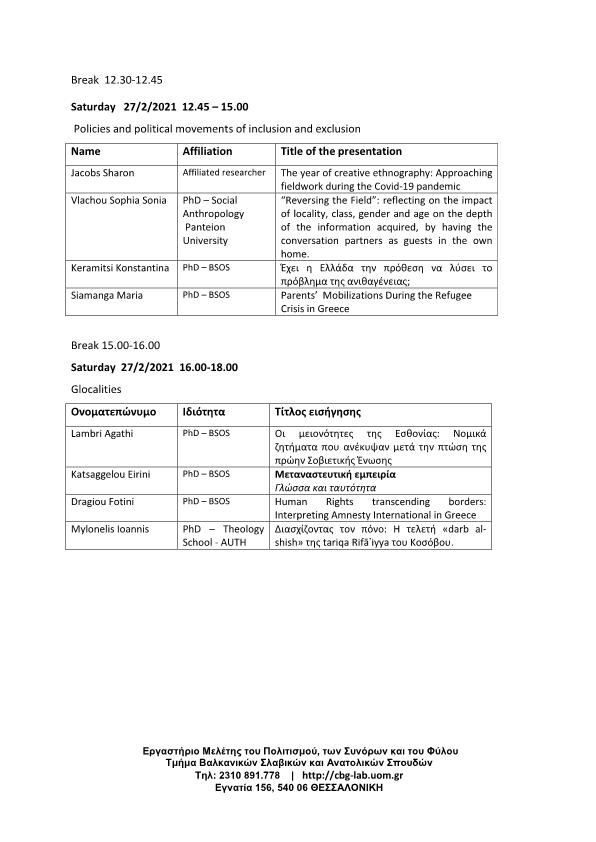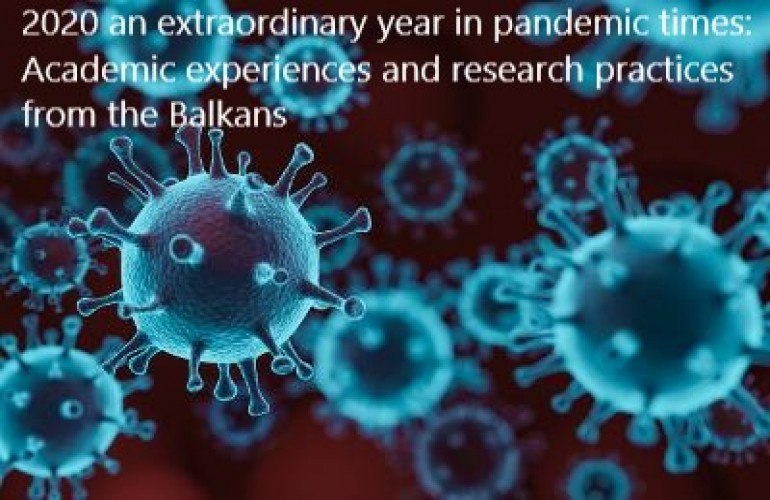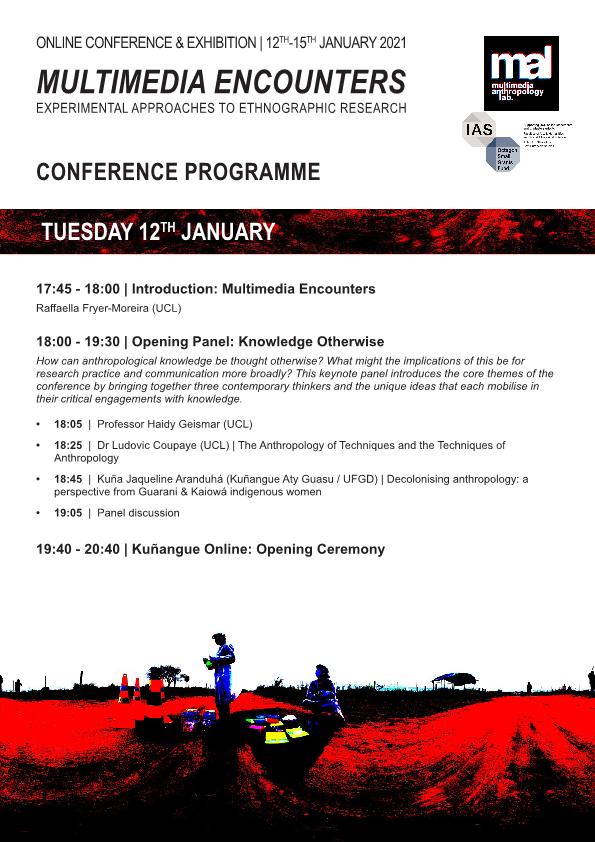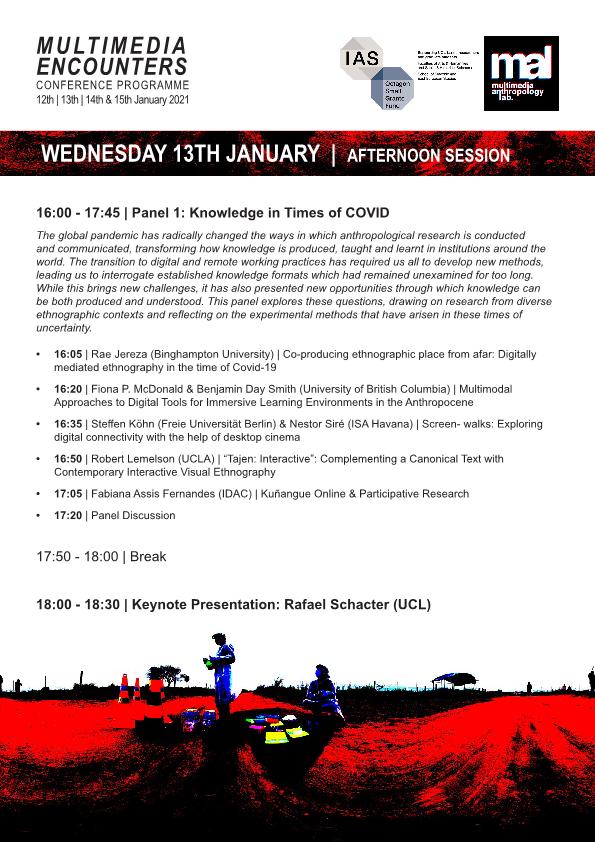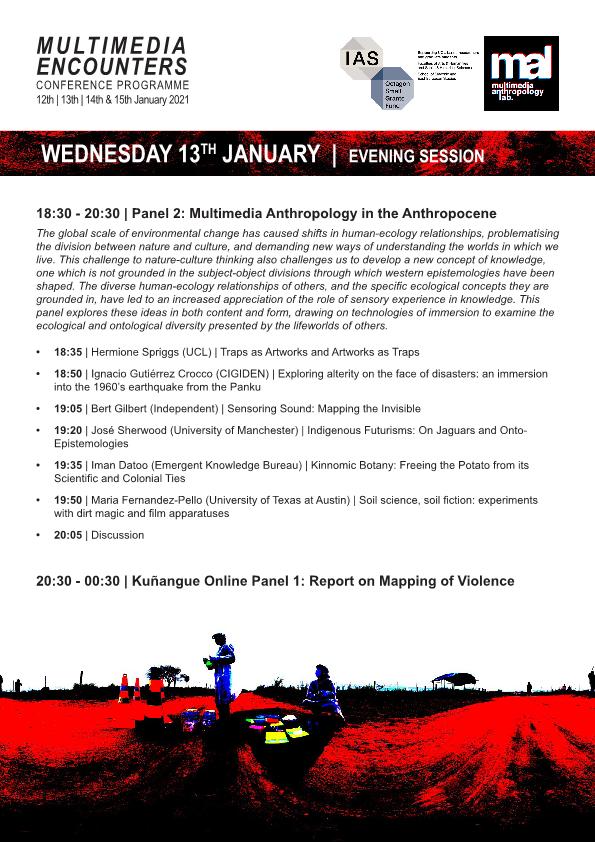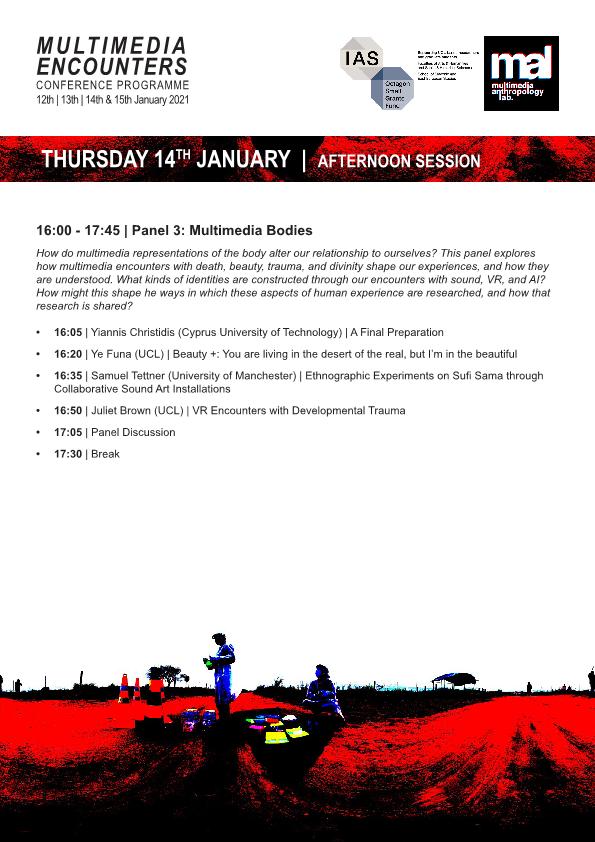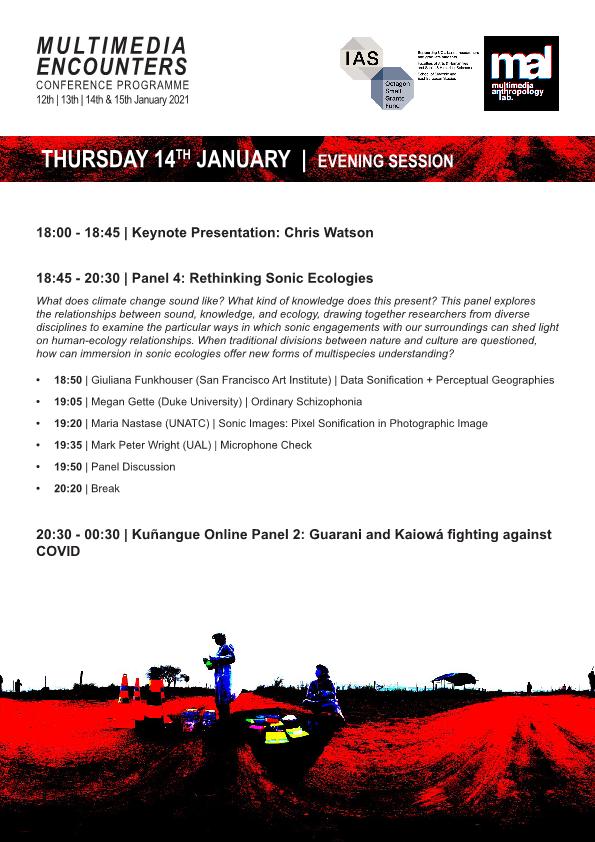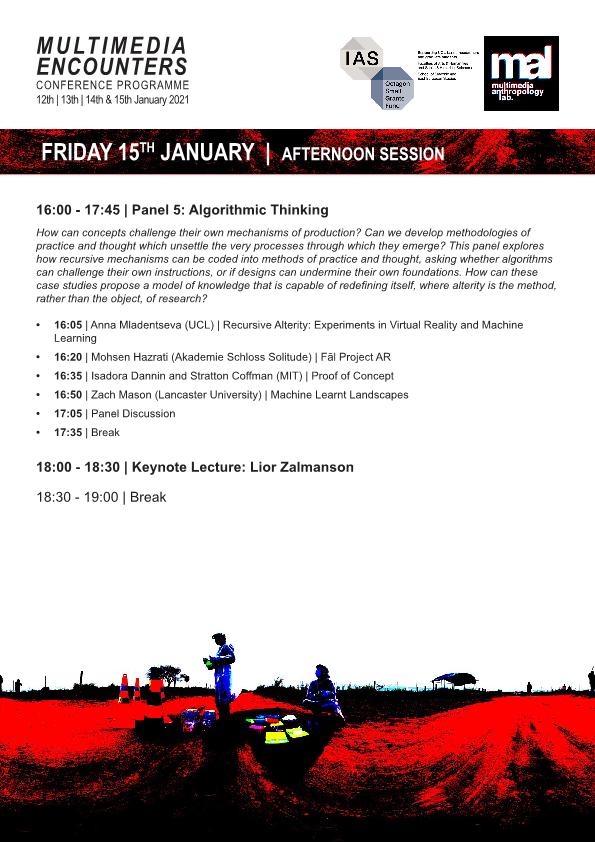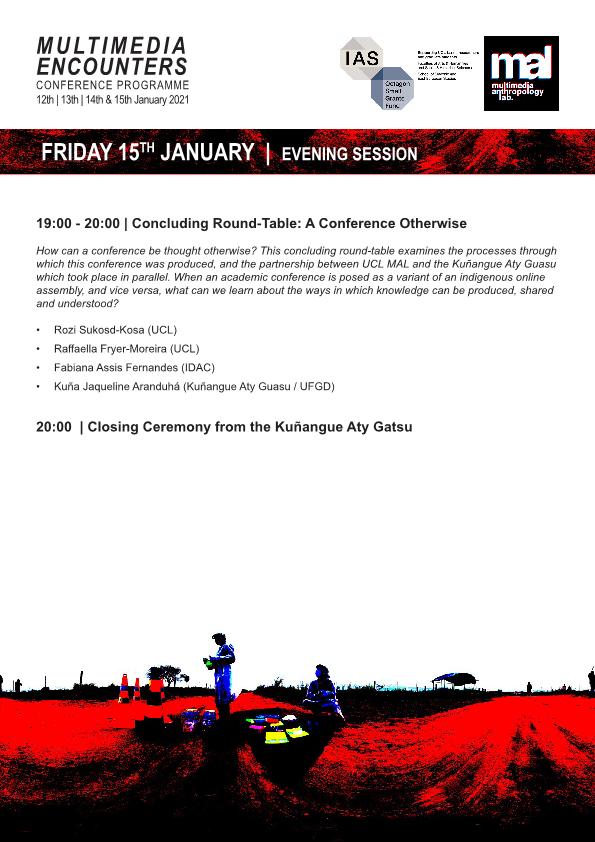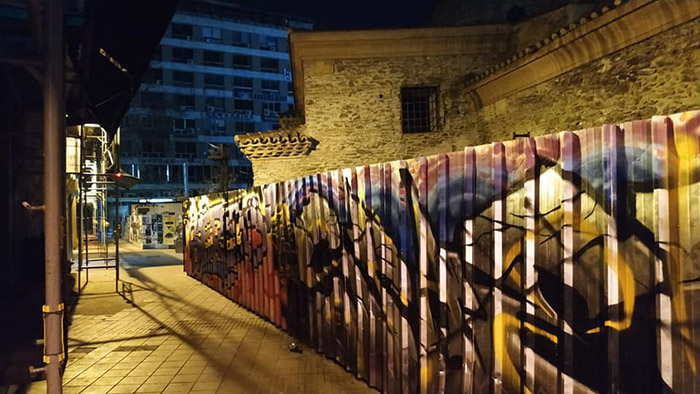
Date: June 9, 2021
Time: 5-8 pm (GMT+3)
Organizers: dëcoloиıze hellάş in collaboration with Culture – Borders – Gender Lab, University of Macedonia, Thessaloniki
Link: here (Meeting ID: 895 447 8253)
Convenor: F. Tsibiridou
This workshop will be organized by the initiative Decolonize Hellas, under the cluster of Cosmopolitanisms/Cosmopolitics. Within this context and, more broadly, within our critique on the self- and hetero-colonizing processes of the hegemonic discourse of Western epistemology and white supremacy, we look into the meanings and transformations of classic Cosmopolitanism, as they have appeared in the era of Colonization and as they survive in the present. In the wake of postcolonial critique and intersubjective multiculturalism, while also counter-pointing the classical or more contemporary notions of cosmopolitanism, we aim to bring in discussion the notions of race and racism, patriarchy and colonial technologies along with intersectional, feminist and other transindividual and embodied activist experiences of heteropolitics – an effort inspired by glocal movements of decolonization and sustains an open dialog with the epistemologies of the South. We look for cosmopolitical practices in social movements, anti/counter-courses, research perspectives and artistic interventions, in planning and cooperative projects, in politics enacted differently. We attend to subaltern voices and histories, as they survive in marginality or in a constant state of borders and liminality, forming the politics of everyday life, knowledge and questioning of academic thought and practice.
We will answer questions such as:
- Could we find nearby examples of local and supralocal epistemologies, analogous to the epistemologies of the South, that are entangled with cosmopolitical practices of decolonization?
- How do the categories of familiar precarity (minorities, refugees, migrants, women, precarious lives and other forms of exclusion), as well as the reflective observation of the boundaries of exclusion, conjoin creatively past cosmologies and technologies, mingling practice with theory?
- How can all the parallel familiar histories of personal experiences, local cosmologies, ethnographic research, oral history, and feminist methodologies be articulated with art, technical knowledge and technology?
- To what extent do practices of inclusion, care and heteropolitics talk back to personal self-interest, to the capitalist exploitation, the colonial matrix of structural racism, of occupation and enclosures, of patriarchy, and of domination over nature?
- What leeway do we have for decolonizing knowledge and politics in Greece and its neighborhoods, referring to the values of humanism but also in search of a universal ideal that will not divide but instead include?
Participants: Michalis Bartsides, Alexandros Kioupkiolis, Ioanna Laliotou, Iris Lykourioti, Penny Travlou, Fotini Tsibiridou, Aimilia Voulvouli, Miltiadis Zerboulis.
Abstracts and Short Bios:
“On cosmopolitics: ethnography and counter publics, marginal Balkan cosmologies and creative Aegean epistemologies”
Fotini Tsibiridou (Prof. of Social Anthropology, Head of the Department of Balkan, Slavic and Oriental Studies, University of Macedonia)
Abstract
The presentation explores the genealogies, meanings, and dimensions of cosmopolitics, as it is being crystallized between research and activism in the heart of Latin America, while also tries to fuel the debate over epistemologies of the South in the context of decolonization today. We look on the importance of intersectionality and precarity in shaping actions and initiatives that challenge hegemony, authoritarianism and the colonization of knowledge about self and others, while striving for the coexistence of life in the planet. Drawing on the example of an ethnographic research on social movements and feminist methodologies in the center of the Global city-Istanbul, but also on the experience gathered from engaging with the collectivity of the Social Workshop of Thessaloniki, from 2008 and for 9 years on, the presentation firstly seeks to identify the coincidences, differences and deviations from the lucophonic world. The encounter of dëcoloиıze hellαş with the possibilities of cosmopolitics opens up new paths for the instrumental and creative exploration of marginal and forgotten cosmologies, such as those still found in the Balkans and Anatolia, which could introduce alternative epistemologies of cosmo-eco-techno-political knowledge (such as those found within the Aegean Sea), in a certain analogy with the Epistemologies of the South.
The presentation proposes examples of alternative publics and anti/counter-courses that will blend academic knowledge and research with activist practices. Instead of simply highlighting voices, differences and tolerance, as postcolonial critique often does, we reflect on the dynamics of alternative epistemologies in the path of cosmopolitics, a reflection capable of transforming the demands of cosmopolitan humanness and its civilizing mission into more equal, inclusive and non-divisive ventures of coexistence in everyday life that strive for self-knowledge and emancipation. Alternative epistemologies of conjoint histories and practices of cosmopolitics, that promote inclusion and care and often have a feminine aura, as they are articulated with feminist methodologies, shape, hesitantly or more vigorously, a deviation from the rationalization imposed by the compliance to the matrix of Western colonization of race, class, gender, region, periphery, heteronormativity and any other trope of exception. Experiences that creatively use marginal Balkan cosmologies or the palimpsest of untold stories that anthropology and oral history often encounter in the Balkan area and in the Aegean islands and coasts, assemble stories and experiences of a new kind of citizenship: life stories and place mythologies that are forbidden, forgotten and disavowed by dominant ideologies and theologies, traumatic memories of subaltern subjects, and muted, dark creatures and materialities. In this context, the presentation will go though stories, experiences, and actions, suitable for research, teaching and alternative publics, that go beyond the Western binary of majorities and minorities and challenge the white supremacy of the empire, the European advantage and the technological superiority as the only alternative of the chain of production, challenge also the urban gentrification projects that sacrifice cities on the altar of uncontrolled development and growth, and the over-exploitation of nature by man.
Fotini Tsibiridou is Professor of Social Anthropology at the Department of Balkan, Slavic and Oriental Studies at the University of Macedonia and acting Director of the Laboratory for the Study of Culture, Borders and Gender. She has done fieldwork in a former refugee village and among the Pomaks in Greek Thrace, in Macedonian and Peloponnese villages and the Sultanate of Oman. She has also researched nationalism and multiculturalist discourses and practices in Greek Thrace, as well as gender, citizenship and creative counterpublics in Istanbul. Currently (since 2018), she is researching two topics: post-Ottoman religiosity and gendered subjectivity in the frame of post-colonial critique (Balkans, Turkey, the Middle East), and feminist and other decolonizing methodologies deployed in creative protests and resistance practices in Mediterranean cities in the way to/of cosmopolitics. She is the cofounder of the CREABALK – Creative Balkans network. https://www.uom.gr/en/ft
“Cosmopolitical Technegeographies: Epistemologies of the South and artifacts-artifices. Toward a decolonization of design”
Iris Lykourioti (Assistant Prof. Department of Architecture, University of Thessaly / A Whale’s architects)
Abstract
The Epistemologies of the South developed by Santos (2012), like decoloniality, apart from being theoretical paradigms that emphasize criticism, constitute a program for broadening the realities and potentialities of our present, past (sociology of absences) and future (sociology of emergences). They aim at the creation of future systems of social production and epistemological formation (ecology of knowledges). They can facilitate the transcendence of binary perceptions of social phenomena and the abyssal social and geopolitical inequalities that have been produced through the centuries of the historical complicity between capitalism, colonialism and patriarchy within the program of modernity. Epistemologies of the South function as a theoretical-epistemological system that aspires at bridging theory and practice (co-production of emancipatory theories and practices) under a ‘rear-guard’ model (intertwined with social movements, demands and resistances), rather than an ‘avant-guard’ model (emancipation stemming from the instructions given by an inspired-specialized elite). Epistemologies of the South can be understood as artisanal work (craft) as opposed to architectural work.
Taking epistemologies of the South as a point of departure (together with theories and practices such as degrowth, peer-to-peer production and ecofeminism), we attempt to imagine design-and-construction futures for producing our contemporary material cultures. We are interested in those futures of making that give precedence to justice, self-sufficiency and emancipation for those subjects that are involved in the making processes (access to materials, social and labor rights, knowledges). In the framework of the research-postgraduate program Technegeographies held at the University of Thessaly and within the methodologies we apply for making spaces and material objects in our design work (A Whale’s architects office for architecture), we experiment on the basis of two principles: a) the coalescence (not competition) between traditional techniques, technical knowledges and technical infrastructures and cutting-edge technologies both widely distributed in both urban and rural environments, and b) the broadening of bibliographical references to both works of folklore/popular/traditional and erudite/high arts, crafts and architectures. Both principles intend to develop coalescent/hybrid techne-epistemic paradigms in the making of things. We are interested in understanding the technical conditions of material production within the contradictions of the Greek peripherality and of crafting potential techniques-artifices that can reverse those conditions. We think that those hybrid techne-epistemic paradigms can deliver artifacts that are socially sustainable and socially integrated because they are based on the abundance (not the scarcity) of widely distributed technologies and technical knowledges, at the scale of small independent production units. Thus they can relieve-reverse structural discriminations and divides between manual and intellectual work or between the city and the countryside. Furthermore they can generate types of ‘artifices’ (innovation) by cultivating inventiveness at a wider scale, socially and geographically. They do that by undoing enclosures (processes of decolonization) of technical knowledge and ingenuity that both condition the chances and rights that societies have for good life and well being (ευ ζην, buen vivir, sumak kawsay κ.α.). We consider that such artifacts and artifices, as products of inclusive, pluriversal, not elitist processes of making, constitute cosmopolitical schemes for the creation of decolonized, cosmopolitan habitats and decolonized aesthetic paradigms.
Iris Lykourioti (b.1970, Athens) is an architect (NTUA 1996, 2001) and Assistant Professor at the Department of Architecture, University of Thessaly, Greece. In 2005 she co-founded A Whale’s architects, an office based in Athens and Brussels doing objects, edifices and research on how the former are being produced and used. Taking into account the anthropogenic character of the production of edifices and the importance of artisanship as fundamental knowledge in social economy and culture, they support the distribution of free lance labor in the production of design objects. Rather than adjusting readymade industrial items, they design and produce buildings and prototype objects in collaboration, exclusively, with qualified artisans and small or family industries. In 2014 the work of A Whale’s architects has been selected by Blueprint Magazine among the eight most innovative architectural practices in Greece. Ηer current academic interests focus on four main fields: a) on epistemological topics related to architectural composition and material production, b) on space, historiography and theory related to gender issues, c) on popular culture and, d) on the political dimension that determines the relationship between knowledge (omitted history), and the design and production of space and material objects, based on the theoretical framework described as Epistemologies of the South. She has edited books, published articles and exhibited architectural projects and research internationally.
“Contemporary democratic alter-politics and grounded political theory”
Alexandros Kioupkiolis (Associate Professor of Contemporary Political Theory at Aristotle University, Thessaloniki, Greece)
Abstract
Recent decades have witnessed the rise of a diverse alternative democratic politics which strives to foster equal freedom in our times breaking both with the mainstream representative politics of parties and governments in the political system and with typical traditions of civic activism. The ‘alter-politics’ (Hage 2015) assigns priority to practice over ideological doctrine, and it champions a visionary pragmatism, which appeals to the people at large. Contemporary democratic alter-politics binds together ‘prefiguration,’ social innovation and counterinstitutions with mass mobilization and involvement with state institutions. It combines assembly-based democracy with representative governance, and it crosses the divide reform/revolution. It is both place-based and globally networked. Finally, this alter-politics is infused with another logic and ethic, which forswear dogmatism and purism, they attend to complexity, diversity, messiness and contradiction, they acknowledge the lack of easy fixes to vexing challenges, they cherish plurality, openness, reflexivity and experimentation.
In our research project –Heteropolitics– we have undertaken a more empirically grounded research into contemporary social movements, institutions and practices that contrive alternative ways of doing politics and of self-governing communities in crisis-ridden Southern Europe (Greece, Italy and Spain). In this research venture, political theory is animated by the idea that an interplay of political thought with anthropology and ethnographic fieldwork can help us to ‘decolonize’ political theory by rethinking and reimagining politics for the cause of equal freedom and the commons through an ethnographic intercourse with everyday political activity and thought. This intercourse is vital for fleshing out more grounded, applicable, specific, variable and concrete conceptions of the political. It is also commendable from the standpoint of a democratic political theory whose practice would be inspirited itself by the values of freedom and equality in the polity. A democratic political theorist does not see her work as the production of conceptual analyses and normative assessments from a position of authority, of ‘the subject who knows’ the truth and conveys this truth or prescribes it to the laypeople. S/he regards, rather, her profession as thought, analysis and discussion which partakes in an ongoing political conversation with other citizens, on a footing of equality, whereby the theorist contributes as an equal citizen to collective debates and deliberations. Hence, the theorist needs to engage with the ideas and practices of her fellow citizens, interlocutors and political rivals.
Alexandros Kioupkiolis is Associate Professor of Contemporary Political Theory at Aristotle University, Thessaloniki, Greece. He has studied Classics (BA, University of Athens), and Contemporary Political Theory (MA, Essex University, DPhil, Oxford University). His research interests are focussed on radical democracy, the commons, social movements, and the philosophy of freedom. He has directed an ERC COG project on these topics (Heteropolitics, 2017-2020) and has published numerous relevant books and papers, including the monograph Freedom after the critique of foundations (Palgrave Macmillan 2012), and the co-edited collective volumes Radical democracy and collective movements today (Ashgate 2014, with G. Katsambekis). Recent publications include the papers ‘Commoning the Political, Politicizing the Common’ (Contemporary Political Theory 17.3, 2018), ‘Movements post-hegemony: how contemporary collective action transforms hegemonic politics’ (Social Movement Studies, 17.1, 2018), the co-edited volume The Populist Radical Left in Europe (Routledge 2019, with G. Katsambekis), and the monograph Τhe Common and Counter-hegemonic Politics (Edinburgh University Press 2019).
“Vivid social spaces or monumentalization? Gentrification policies and the production of «non places» at Thessaloniki’s historical centre”
Miltiadis Zermpoulis (Dr. of Social Anthropology-University of Macedonia, Researcher/ Deputy Head of the Institute for Transcultural Competence at the Police Academy of the Free and Hanseatic City of Hamburg)
Abstract
This presentation is founded upon the discussion about “cosmopolitics” and “cosmologies” in the daily life of the city in order to point out unpopular discourses, social practices and agencies from below that had been reproducing socially the space around the old town Hall, well known by the citizens of Thessaloniki as “Kervanserai”. Processes and politics of gentrification and “cultural” salience of the space according to national and colonial monumentalization strategies endanger the spatial reality of an urban memory palimpsest and an intersectional life in the neighborhood. For almost a hundred years, residents, shopkeepers, visitors and buildings (monumental or not) had been forming a vivid network of interaction, producing and reproducing socially this famous neighborhood of antique shops, cheap and occasional consumption, and also night life for ordinary people – right at the historical center of the city. The last fifteen years this space reflects a sense of abandonment and dereliction. It seems that this dereliction and disarray of the spatial social network is connected to hegemonic gentrification policies that overlook the social relations and the modern history of the space, banishing violently actors and practices that are constitutive of this neighborhood. Regarding these differently articulated discourses and practices which help imagine and mark the future of this space our presentation is willing to problematize the special meaning of being and becoming a monument in the theoretical frame of colonization. We openly discuss alternative uses that can free and unblock the space and its materialities from the symbolic and national politics of cultural and racial supremacy, and religious conservatism. A process of “demonumentalization” and “desymbolization” of the urban space and its materialities can be, on one side, useful “cosmopolitically” for a more democratic and equal participation in the city and, on the other side, can prevent its social dereliction. Such an attitude under the terms of decolonization could probably create continuities for day-to-day intimacies, activating the reflection on repressed ways of life in the city.
Miltiadis Zermpoulis holds a PhD in Social Anthropology from the Department of Balkan, Slavic and Oriental Studies at the University of Macedonia in Thessaloniki. Between 2017 and 2021 he worked for a migrant organization in North Rhine – Westphalia, Germany. From 1 June 2021 he works as research associate and deputy head of the department at the Institute for Transcultural Competence at the Police Academy of the Free and Hanseatic City of Hamburg. Miltiadis conducted fieldwork in Germany and Greece. His academic interests include material culture, anthropology of space, state culture, social classes, post-colonial theories, ethnic/ religious minorities and migration.
“‘The Women’s Centre of Karditsa’: Heteropolitics and the Politics of Care in the context of an ecosystem of Social and Solidarity Economy”
Aimilia Voulvouli, Social Anthropologist, Post-doctoral researcher, Aristotle University of Thessaloniki
Abstract
The presentation will trace the ‘heteropolitics’, that is, alternative forms of political participation, of anintersectional venture namely, the Cooperative Ecosystem of Karditsa (CEK), which promotes collective self-management of common resources and has the potential tocatalyze democratic transformation towards more liberal and egalitarian societies. In this framework, I will briefly present CEK as an intersectional venture that produces another politics of self-management and horizontality, alternative to the vertical hieararchy of state-centred politics and then I will focus on the Women’s Centre of Karditsa (WCK) which is one of the founding entities of the ecosystem.
Τhe Womens’ Centre of Karditsa stimulates the political imaginary of everyday interactions permeated by the affective engagement of ones’ work subject and the ethics of care that circumscribe their work. These result in the practice of affective micropolitics that enact the unimaginable, proliferate innovations and animate micro-transformations that have the potential to effect macro-transformations, initially in the ecosystem and gradually beyond its borders. At the same time, it cultivates a collective condition of existence where the subjectivities involved are re-produced through the decolonization of the political from the hierarchical state-centred model but also through the assumption that the ‘personal is political’. In this way, the Ethics of care are transformed into a ‘politics of care’ that prefigurates politics in common (commoning) and challenge economic, social, cultural and gender hierarchies and hegemonies and address issues of equality, justice and democracy.
Aimilia Voulvouli (B.A. Univerity of the Aegean, MA SOAS, Ph.D UCL), is a social anthropologist, currently a post-doctoral researcher at the Aristotle University of Thessaloniki. She has conducted ethnographic research in Turkey, Greece and USA. Her research interests include the study collective action, the commons, precarity, and the politics of everyday lifeand she has published the relevant monograph From Environmentalism to Transenvironmentalism: The Ethnography of an Urban Protest in Modern Istanbul (Peter Lang 2008),as well as contributions to collective volumes such asthe chapter ‘Anatolian Tigers and Anatolian scarves: Neo-liberal entrepreneurship and neo-islamic ethics in a central Anatolian city of Turkey (in Tsibiridou Fotini (ed.) Ethnography and Everyday practices in ‘Our Own East’. Athens: Kritiki Publishing, 2020, in Greek), articles in journals such as ‘The vicious circle of precarity: Being academic in the era of Neoliberalism and Authoritarianism’ (Social Anthropology/Anthropologie Sociale, 2019) and ‘From Tarlabaşı to Gezi and beyond: The 2013 event in the conjuncture of Neoliberal times’ (Greek Review of Social Research, 2017).
“For the decolonisation of ethnographic practice”
Penny Travlou (Lecturer in Cultural Geography and Theory, Edinburgh School of Architecture & Landscape Architecture, University of Edinburgh)
Abstract
In the introduction of the book “Epistemologies of the South”, Buoventura de Sousa Santos proposes a Manifesto for BuenVivir, ‘good life’, in juxtaposition with a Manifesto for Intellectual Activists. He issues a call for resistance to TINA and the triad of the Global North, capitalism, colonialism and patriarchy, by envisioning the possibilit(ies) of an alternative world. This is a double call: to acknowledge the importance of the epistemologies of the South, and to recognise the necessity for political action. “It is a time of epistemological imagination aimed at refounding the political imagination […] to strengthen the social struggles against domination” (Santos 2018: 126-127).
Following Santos’ two manifestos, I will unpack how thinking from the South requires an epistemic decolonisation of the ‘ethnographic practice’. The question here is very simple: What are the methodological tools to think with others for an alternative world? The presentation will draw from multi-sited ethnographic fieldwork in Medellin (Colombia) and Athens (Greece) – two cities that challenge the dichotomy of centre and periphery, Global North and South – during the last 6 years, a time of socio-political upheaval. The study looks at intangible cultural heritage as currently constructed within the framework of everyday resistance and struggles to create cultural commons, shared knowledges and practices, in the search for alternatives to capitalism, colonialism, and patriarchy. Unlearning, radical imagination, thinking with others, are some of the methodological tools that have been experimented with and tested throughout the ethnographic fieldwork, to allow an emerging pluriversal network of knowledges to become visible.
Penny Travlou is a Lecturer in Cultural Geography and Theory (Edinburgh School of Architecture & Landscape Architecture, University of Edinburgh). Her research focuses on politics of public space, social justice, the commons, collaborative practices, cultural landscapes and ethnography. She has been involved in international research projects funded by the EU and UK Research Councils. Since 2011, she has been doing ethnographic research on collaborative practices in emerging networks (e.g. digital art practitioners, collaborative economy initiatives, translocal migrants). Her most recent research is on cultural commons in Colombia and solidarity networks in Athens. Alongside her academic work, Penny is an activist on social justice and urban commons. She is Co-director of the Feminist Autonomous Centre for Research (https://feministresearch.org/).
“From the internal exclusion to Cosmopolitics”
Michalis Bartsidis (Dr. of Political Pholosophy, Hellenic Open University, Scientific Director of the Nicos Poulantzas Institute).
Abstract
In the context of classical cosmopolitanism, what prevailed was the dominant universal ideal of the linear progress of humanity towards its union, having as its aim the creation of a peaceful, civilized and fraternal world. This ideal served as a common representation of individuals, groups and classes inspiring respective practices. However, before but mainly during the 20th century, a series of historical events (colonialism, the Holocaust) and processes (collapse of modern unifying ideologies, migratory movements, perpetuation of various inequalities) dissolved this perspective leaving a field of heterogeneous representations of a divided humanity with multiple temporalities. Today, the issue is no longer just the inequalities. It is their consolidation by articulating various exclusions in a particular and paradoxical social, cultural and anthropological condition: we live and act in a universality without a universal ideal.
The absence of a universal ideal creates an internal blockage in the process of constituting individual and collective identities. In a condition of internal exclusion the human subjects are hovering, almost hysterically we would say, without being able to use any model of transforming passions into reason and experiences into thought, thus narrowing the inner space, that is the vantage point from which they see the infinity of the world as more and more finite.
Modern cosmopolitan Western values also functioned as hegemonic demarcations, as hierarchies that were imposed on a vast variety of other knowledge, cosmologies and practices of the peoples, tribes and communities of the global South, leading to a constant “knowledgecide” of the multiple “metis”(μήτις) of the world, resulting in loss of sovereignty as well as in loss of the possibility of emancipation.
Going into the decolonial condition, these hierarchies, discriminations and exclusions that lead to excessive violence(and the resistance in a Fanonian modality), now continue within the boundaries of the western countries, somehow internalizing now the boundaries that were imposed on others of the “rest of the world”.
We oppose cosmopolitics to abstract ideals, as practices that challenge social hierarchies, racial sovereignty, and cultural hegemony. According to an ontology that we can qualify as transindividual, the constitution of the subjects and the constitution of their mutual relation are viewed as simultaneous processes. From that perspective the social bond is to be situated within us and at the same time outside us, on the level of common practices, experiences, images and institutions. Instead of divisive and separatist practices, we must privilege the transindividual practices of inclusion, the experiences of care, solidarity, autonomy, emancipation and love that allow societies and individuals to the cross their internal borders.
This project aims to study the World Social Forum – Thessaloniki Social Workshop (2003, 2009-2013) as an example of alternative politics, and precisely as an experience of cosmopolitics with a particular focus on the “Cosmopolit seminar” inspired by the experience of the Caracoles in Chiapa-Zapatistas.
Why is such a double movement of return or recursion and expansion, so important in the actual decolonial context? On the one hand, those movements and examples constitute the lost knowledge that was defeated as soon as it emerged, but was the fruit of an encounter where we learned to do politics in a different way. We can now recognise and integrate this knowledge in an inclusive history. On the other hand, because by articulating these experiences with the planetary crisis, we aim to contribute by local experiences to a transindividual non-anthropocentric theory, as an alternative cosmology and ontology.
Michalis Bartsidis, is a Dr. of Political Philosophy (University of Ioanina) teaches Philosophy at Hellenic Open University. He is the Scientific Director of the Nicos Poulantzas Institute. He has taught at the Department of Philosophy and Pedagogy of the Aristotle University of Thessaloniki, at the University of Panteion and in other Postgraduate Programs. He defended his doctoral dissertation on: Philosophy and Politics in the work of Etienne Balibar. He elaborated and supported his postdoctoral position (postdoc) in the Department of Philosophy of the Aristotle University of Thessaloniki on “Crossing the ” internal border”, Research οn Political Ethics”. His publications and research interests move in the field of Political Philosophy and Contemporary European Philosophy and include the volume Transidividuality, Essays on an ontology of relation, Athens, Nissos, 2014.
“Refugeeness at Critical Times: affective cosmopolitanism and critical regionalism”
Ioanna Laliotou (Associate Professor in Contemporary History Vice-Rector of Research and Lifelong Learning, University of Thessaly in Greece)
Abstract
Two pivotal concepts derived from postcolonial thought are retrieved in this presentation: affective cosmopolitanism and critical regionalism. Both these concepts have been pivotal in the context of postcolonial theory, globalism and political activism since 2000s. I seek to revisit these two concepts in the light of developments related to refugee movements in the Eastern Mediterranean and Greece during the last decade. These two concepts are presented through bibliographical references to writings of thinkers such as Gayatri Spivak and Paul Gilroy. Subsequently, there is an attempt to relate these concepts with the contemporary realities of refugeeness and developments that took place in Greece during the last decade. I propose to rethink refugeeness and postcolonial concepts in relation to two major parallel and intertwined planetary, but also local events: the 2008- fiscal crisis on the one hand and the current pandemic crisis on the other. During the last two two years, the antinomies and related to refugee statelessness within the nation state were further aggravated by the pandemic conditions. The pandemic has opened up a new space of unprecedented state intervention in the public and private lives of citizens, while reconfiguring the meaning of globalization. Questions of democracy, statehood and statelessness, mobility, access, restriction and enclosure are now re-conditioned under the two-fold historical contingency of refugee life and citizen life in a pandemic.
Ioanna Laliotou is Associate Professor in Contemporary History at the Department of History, Archaeology and Social Anthropology, University of Thessaly in Greece. She is currently Vice-Rector of Research and Lifelong Learning. She is author of Transatlantic Subjects. Acts of Migration and Cultures of Transnationalism between Greece and America (Chicago: Chicago University Press, 2004) and co-editor of the collective book Women migrants between the East and the West: Gender, mobility and belonging in contemporary Europe (London: Berghan, 2007). She writes, teaches and researches on issues related to cultural history, subjectivity, mobility, migration, refugeeness and visions of future and utopia in contemporary society. Her most recent book is Ιστορία του Μέλλοντος. Πως ο 20ος αι. Φαντάστηκε έναν «άλλο κόσμο» [History of the Future. How the 20th century imagined a different world] (Αθήνα, ΕΚΤ, 2017) is on The Future in History: how the twentieth century imagined the future (Αthens: EKT, 2016). She has been a Fulbright Visiting Scholar and an Andrew Mellon Visiting Professor at Columbia University.


